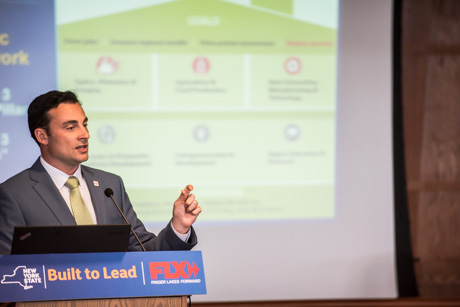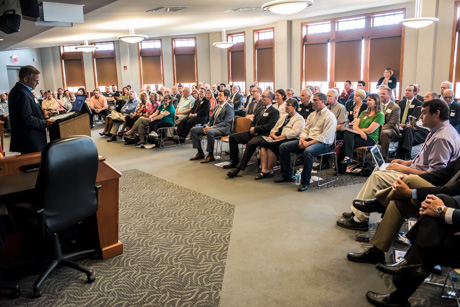Grow-NY aims to add to the 289 new jobs created by previous winners over the past five years, including in Central New York, the Finger Lakes, and the Southern Tier.
Empire State Development (ESD) today announced that the application window is now open for the sixth year of the Grow-NY food, beverage, and agriculture business competition. Grow-NY attracts high-growth potential food and agriculture startups to compete for $3 million in total prize money each year and supports 20 finalists through a business development phase that connects them with the region’s resources.
The Grow-NY region is a 22-county area spanning Central New York, the Finger Lakes, and the Southern Tier. It is a unique initiative that connects innovators and investors in the food, beverage, and agriculture sectors both locally and internationally. Grow-NY has resulted in economic growth and entrepreneurial opportunity in upstate New York over the past five years.
Since the program’s launch in 2019, its winning startups have created 289 new jobs and attracted millions of dollars in follow-on investment as a result of winning the competition.
Year 6 of the program invites startups from around the world to "grow and lead change," situating the accelerator and competition at the center of an emerging, climate-smart bioeconomy. Grow-NY offers food and ag-tech startups from around the world the opportunity to win up to $1 million, as well as dedicated business mentorship and introductions to the region’s leaders and resources to connect them to potential partnerships and other strategic opportunities.
In exchange for making a positive, measurable impact to the region’s economy through economic development activities such as job creation, Grow-NY winners receive their prize money as an investment into their company.
One finalist will receive a top prize of $1 million; two others will be awarded $500,000 prizes; and four more will be given $250,000 prizes.
The program is funded through Empire State Development from the Upstate Revitalization Initiative’s three regional entities, CNY Rising, Finger Lakes Forward, and Southern Tier Soaring, and is administered by Cornell’s Center for Regional Economic Advancement.
Empire State Development President, CEO and Commissioner Hope Knight, said, “Grow-NY is a unique initiative that links agribusiness innovators with experts and investors, creating entrepreneurial opportunity in upstate New York. The sixth round of the accelerator will no doubt build on Grow-NY's incredible success, helping to further grow the next-generation ideas of these industry pioneers and bring significant investment to the region, bolstering the future of this crucial industry in New York State and around the world.”
State Agriculture Commissioner Richard A. Ball said, “Year after year, I’ve had the incredible honor of helping to award the innovative winners of the Grow-NY competition. New York is one of our nation’s agricultural leaders, attracting cutting-edge food, beverage, and technology entrepreneurs from around the globe, and Grow-NY is a great platform to spur growth in this industry and create jobs. I encourage all eligible businesses to take part in this opportunity.”
The startup competition begins its sixth year with impressive momentum, having garnered applications and interest from over 1,500 businesses in 43 unique states and 49 countries outside of the United States over the last five years. In all, 97 startups have participated as finalists, with 35 winners sharing $15 million in startup funding as well as the invaluable mentorship and networking benefits that the program delivers to finalists.
Benjamin Z. Houlton, the Ronald P. Lynch Dean of Cornell’s College of Agriculture and Life Sciences said, “Cornell University is proud to partner with Grow-NY to advance science-based solutions that support climate sustainability, agri-food systems, and economic growth in our region and beyond. As New York’s Land-Grant institution, we’re dedicated to sharing knowledge and empowering innovators whose vision supports a circular bioeconomy that can bring new sources of revenue to our exceptional growers, producers, and communities.”
In addition to emphasizing innovation and scalability, the Grow-NY program is focused on drawing more diverse leaders to the region by reaching communities that have historically been left out of the innovation economy. In 2023, 61% of the 323 applicants included a founder from an underrepresented minority group, and 42% included a female founder.
Past Grow-NY winners have continued to raise money, expand, and succeed. Year 5 grand prize winner Hypercell was featured in an article in Forbes magazine shortly after winning the competition, and Year 4 $250,000 winner Vivid Machines went on to complete an additional $4.3 million seed round.
Hempitecture, a $500,000 Year 4 winner, became the first company to open an industrial hemp manufacturing facility in the U.S.
Grow-NY program director Jenn Smith said, “The Grow-NY region has unparalleled natural, economic, and agricultural resources that we’ve directed to helping food and ag startups grow their businesses, and change our agrifood system in the process. We’re looking for ambitious founders from around the world to join us.”
Applications must be submitted by 5 p.m. ET on Wednesday, May 15. In August, up to 20 finalists will be assigned mentors and enter the business development phase. The selected finalists will present their business plans during the Grow-NY Summit on Wednesday, Nov. 6 and Thursday, Nov. 7 in Ithaca, New York, alongside a symposium of panel conversations and keynotes, a showcase of agencies, companies, research groups, and other organizations that serve startups working in food and ag, and a student stage where middle and high school aged New Yorkers will pitch their ag and food tech ideas.
To learn more about the judging criteria used to determine award decisions, click here.
The Grow-NY region, which hosts over 40% of New York’s 33,438 farms, includes an abundance of vibrant, fertile lands and freshwater along with major urban population centers such as Rochester, Syracuse, Ithaca, and Binghamton. To learn more about the Grow-NY region, click here.
To learn more about the Grow-NY competition, visit www.grow-ny.com.
To learn more about the Cornell Center for Regional Economic Advancement, visit http://crea.cornell.edu/.
Accelerating Finger Lakes Forward
Today’s announcement complements “Finger Lakes Forward,” the region’s comprehensive strategy to generate robust economic growth and community development. The regionally designed plan focuses on investing in key industries including photonics, agriculture and food production, and advanced manufacturing. More information is available here.
Accelerating CNY Rising
Today's announcement complements “CNY Rising,” the region’s comprehensive strategy to generate robust economic growth and community development. The regionally designed plan focuses on capitalizing on global market opportunities, strengthening entrepreneurship and creating an inclusive economy. More information is available here.
Accelerating Southern Tier Soaring
Today's announcement complements “Southern Tier Soaring,” the region’s comprehensive strategy to generate robust economic growth and community development. The regionally designed plan focuses on attracting a talented workforce, growing business and driving innovation. More information is available here.



